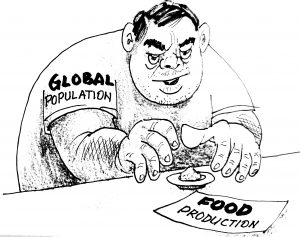One of the key issues faced by the community of nations is an increase in the number of people, while the amount of food produced remains the same. As a result, there is less food available for each person, leading to food shortage. This problem is compounded by a variety of factors, making it an urgent issue that needs to be addressed through proper planning, distribution, and support.
The leading factor contributing to food shortage is increasing world population. The world’s population is expected to reach 9.7 billion by 2050, meaning that food production must increase by 70% to meet global food needs. While the food produced has increased in the past, it has not kept pace with the rising demand. As certain regions around the world have limited land available for farming, food production has become a major issue in places already experiencing food shortage.
Climate change is another factor, leading to droughts and flooding in various regions. Extreme weather conditions posed by climate change often lead to crop failure, thereby reducing the amount of food produced. As a result, food shortages arise, while food prices increase because of limited supply. In many developing countries, farmers depend on rainfall; climate change has made it more difficult for them to grow crops with the erratic seasons.
Food waste is also contributing to the problem of food shortage. According to the Food and Agriculture Organization (FAO), one-third of food produced yearly is thrown away or lost. In developed countries, consumers waste food by overbuying and not eating it before it expires. In developing countries, food is lost during production, transportation, and storage, meaning that it never makes it to the market. Food waste may not seem significant, but considering the economic, social, and environmental impacts of food production, waste reduction is crucial in ensuring that food shortages are addressed.
Appropriate education and public policy reforms must work in tandem to support the production of high-quality, healthy food. Governments across the world must work collaboratively to address the issue and provide vital support to the population to meet their dietary needs while providing solutions to this critical issue. Failure to take the necessary action may lead to devastating social and economic consequences, ignoring the urgency of such a problematic issue would not only be imprudent but also a failure of adequate leadership.




